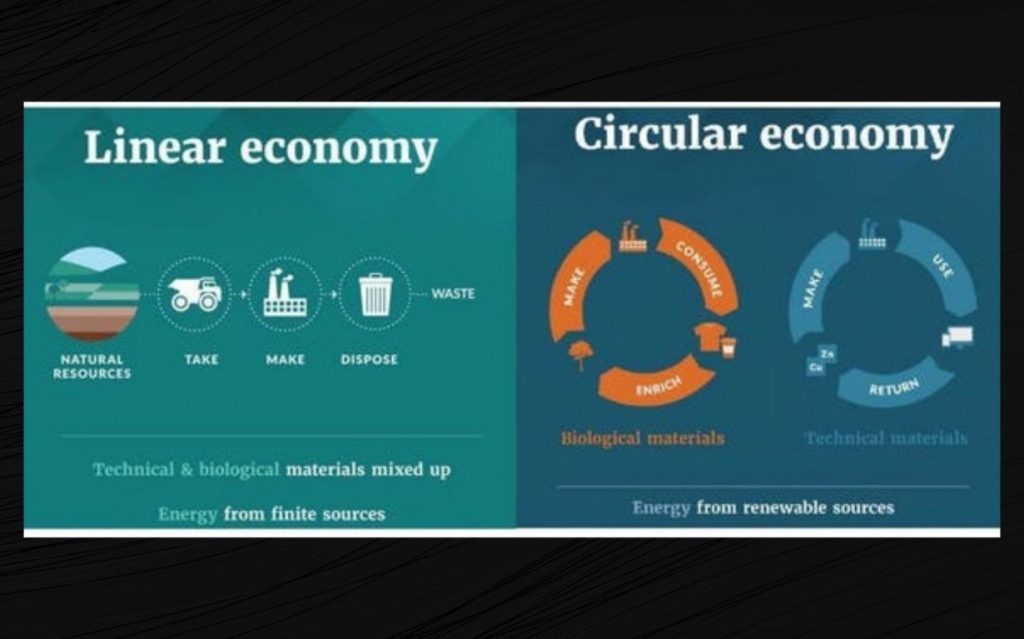
5 Crucial Reasons For Implementing A Circular Economy For Sustainable Development
Linear consumption is reaching its limits. A circular economy has benefits that are operational as well as strategic, on both a micro- and macroeconomic level. This is a trillion-dollar opportunity, with huge potential for innovation, job creation and economic growth.
As a closed loop system where goods and materials retain their maximum value, a circular economy aims to restore the environment by reducing consumption of finite resources which drastically lessens production of waste. Through actions such as reducing waste, reusing goods, and recycling materials, citizens and businesses alike can successfully implement a circular economy within society.
Traditionally, our economy, even more so after the Industrial Revolution, has been ‘linear’. A linear economy follows the “take-make-dispose” method and, in the process, creates tons of waste each year as goods and materials are disposed before extracting their maximum value. Essentially, the linear economy’s main goal is to produce and sell as many products as possible. However, this goal places excessive pressure on the environment and jeopardizes finite natural resources.
The world generates 2.01 billion tonnes of municipal solid waste annually, with at least 33 percent of that—extremely conservatively—not managed in an environmentally safe manner.
Hence, citizens, governments, businesses, and civil society must implement a circular economy to minimize waste and address environmental consequences, such as the acceleration of climate change and pollution, resulting from a linear economy.
1. MINIMIZES ENVIRONMENTAL HARM
The ecological disadvantage of the linear economy is that the production of goods is at the expense of the productivity of our ecosystems. Excessive pressure on these ecosystems jeopardises the provision of essential ecosystem services, such as water, air and soil cleaning.
Promoting the use of biodegradable materials, a circular economy aims to restore the environment through altering the manufacturing process of businesses to a more sustainable method. By creating materials from disposed goods/products, companies significantly divert waste away from the landfill while simultaneously reducing material costs.
For instance, Interface, a global manufacturer of commercial flooring, promotes a circular economy by reducing its carbon footprint through the production of all carbon neutral floors. By buying recycled materials from residents in poverty-stricken areas to build their products, Interface encourages economic growth within the local community.
Similarly, Earth5R, an Environmental NGO promotes a circular economy through their Home Equals Planet Project, a project dedicated to educating Mumbai slum residents on actions to pursue a sustainable lifestyle. One such action is to upcycle waste products such as discarded cloth and paper into usable products that can be sold on the market. Not only does this action enrich the local economy, but it also minimizes post consumer waste within the environment.
In total, a community income of ₹22,99,500 was generated from selling recyclable waste and ₹4,52,87,375 value in Circular Economy was created under the Sustainable Community Program (Earth5R).
Through incorporating a sustainable approach within their manufacturing process, businesses not only reduce environmental harm and pollution from post consumer waste but also enrich the economy through financial opportunities.
2. PROMOTES ECONOMIC OPPORTUNITIES & INDIVIDUAL EMPOWERMENT
The circular economy is estimated to be worth $4.5 trillion globally by 2030.
Worth trillions in worth, the circular economy fosters substantial economic growth through multiple industries.
The potential value of the Circular Economy in GDP Growth and job employment within the economy (RaboResearch – Economic Research)
The recycling industry is a powerful engine in the economy; in 2018, the industry created over $110 billion in economic activity, 534,000 jobs, and $13.2 billion in tax revenues for governments across the country.
And this is only the US! With the recycling industry growing throughout the world, there is an opportunity to foster trillions more dollars and millions more jobs within the economy which are currently lost to the modern linear model.
At a more individual level, the circular economy can help you save money everyday! For instance, instead of buying an expensive suit or dress as merely a one-time outfit, renting it can save you hundreds of dollars! Similarly, instead of spending more money on buying new clothes, mending your old clothes or bringing it to a nearby Repair Cafe can not only save you money but also reduce your carbon footprint!
As a necessary investment, a circular economy is crucial for bolstering the economy both in the present and in the future.
First Repair Cafe in Amsterdam created with the goal of minimizing waste, using resources responsibility and connecting people in an inspiring way (Bold & Open)
3. BOOST BUSINESS SATISFACTION THROUGH CORPORATE SOCIAL RESPONSIBILITY
Circular economy business models keep products and materials in use, by design, for as long as possible to get the maximum value from them.
To meet the growing demand for more sustainable and eco-friendly products, businesses must shift to new approaches for meeting consumer demand while still producing revenue. One such approach is adopting a circular economy business model.
A circular economy business model places a special emphasis on closing the loop in the linear economy, so that value in products and goods are maximized. For instance, reusing post consumer waste as a resource can not only save money, as there is certainly a ready supply of waste, but also attract more consumers as a growing number of consumers each year are becoming more environmentally conscious of the goods they purchase.
Offering new commercial opportunities, a circular economy business model can contribute to business growth and sustainability while simultaneously reinforcing positive business reputation, thus creating a better brand recognition.
Moreover, corporate social responsibility with a focus on the circular economy can further attract and retain employees eager to create a change within the world. Studies show that employees, who perform corporate social responsibility, are more likely to stay motivated in performing their jobs.
CSR has been found to increase a business‘ market value by up to 6 percent, increase employee productivity by 13 per cent, and improve employee engagement by up to 7.5 per cent (Project ROI).
Engaging stakeholders with corporate social responsibility will not only generate “long-term benefits such as better data quality and integrity, more organized records for quick reference and access, enhanced security and privacy, and a system that truly supports the work of the company employing it,” but also empower a team to create larger change within the community.

Corporate Social Responsibility’s impact on the Environment and Society (HERMES)
Clearly, companies who make the decision to adopt corporate social responsibility with a focus on circular economy will certainly reap many benefits including an increase in profit, brand reputation, and better relationships with stakeholders.
4. REDUCES WASTE FROM TRADITIONAL LINEAR ECONOMY
With the goal of minimizing waste, a circular economy closes the loop in traditional linear economies by reusing waste, hereby reducing the amount of trash in our landfills.
Through upcycling, increasing the lifespan of materials, minimizing loss of value, and recirculating materials, the circular economy can reallocate a significant amount of our waste back into society.
Using biogas plants to process manure into bio-methane, a potential source of energy, can be life-changing as many countries struggle to rid the vast discharge of dung from livestock. As a win-win situation, using biomethane can not only reduce waste from cow dung but also reduce the use of fossil fuels for energy.
Converting waste to energy through the use of Biogas (Environmental and Energy Study Institute)
Moreover, cow manure can also be used as an effective organic fertilizer for crops. Instead of using synthetic fertilizers, which often leach into soil and pollute waterways, cow manure can be used as a source of high nutrients for the soil, essentially performing the same role as solid fertilizers but without the risk of pollution.
Hence, adopting a circular economy within society leads to widespread environmental benefits that produces a healthy and sustainable planet for all.
5. SHIFTS TO RENEWABLE ENERGY
Renewable energy resources make up 26% of the world’s electricity today, but according to the IEA its share is expected to reach 30% by 2024.
As one of the pillars of the circular economy, renewable energy simultaneously reduces exploitation of nature, and pollution from fossil fuel combustion. In industrial societies, renewables provide a reliable and limitless power supply, thus enhancing our energy security and reducing additional costs associated with other nonrenewable energy sources.
In agricultural aspects of our economy, renewable energy significantly boosts the local economy while simultaneously increasing food supply. Many farmers have permitted wind turbines to be built on their farms. In turn, farmers receive “$2000 to $5000 a year for each turbine installed” while continuing raising their livestock and planting crops below the turbine. Indeed, many farmers have purchased wind turbines in order to produce an abundance of electricity to use on the farm.
Furthermore, a new sector in energy is growing rapidly from the agricultural society: biomass energy. Biomass energy, such as through the production of ethanol fuel, is an attractive choice for many due to its large availability and carbon neutral aspect.
In the future, biomass has the potential to provide a cost-effective and sustainable supply of energy, while at the same time aiding countries in meeting their greenhouse gas reduction targets.
All together, renewable energy sources seek to reduce greenhouse gas emissions from all sectors within society. As an integral part of the circular economy, renewable energy minimizes greenhouse gas emissions from the supply chain and thus addresses major global issues, such as climate change and air pollution. Renewable energy has the potential to “provide over 90% of the reduction in energy-related CO2 emissions by 2050.”
Specifically aligning with Goal 7 of the UN Sustainable Development Goals, renewable energy accelerates our transition to a net-zero carbon economy by promoting a clean and increasingly affordable source of energy.
SUSTAINABLE DEVELOPMENT FOR A HEALTHY PLANET
All in all, a circular economy yields significant benefits to our agriculture, domestic, and industrial sector of our society. Most importantly, it tackles major global issues of biodiversity loss, resource scarcity, global warming, and pollution through its carbon-free aspect and restoration of the ecosystem.
Through the implementation of the circular economy in the Paris Climate Agreement, UN Sustainable Development Goals and many other international treaties, the circular economy is gradually being embraced into our society. However, community action requires individual effort. Through adopting a sustainable lifestyle, we play an integral part in society’s aim to create a healthy planet for all.
ABOUT EARTH5R
Earth5R is an environmental organization from India with its head office at Mumbai. It works with the NGO sector, Companies and helps them conduct environmental Corporate Social Responsibility (CSR) programs across India.
Earth5R specializes in circular economy based projects. Earth5R also offers short term and long term environmental courses and fellowships.
– Reported by Claire Hsu


